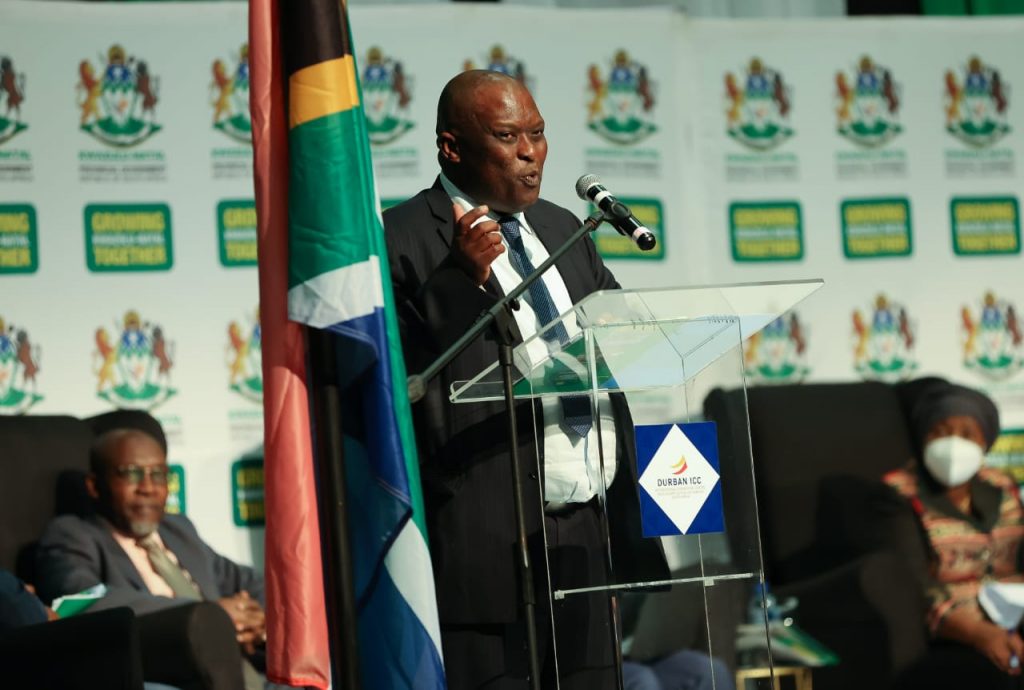

In addition to Traditional Councils established and recognised in Chapter 3 of the Act and Traditional Leadership recognised in Chapter 4 of the Act, the following Traditional Institutions are recognised for purposes:
- the Provincial House; and
- the Local Houses;
Establishment of KwaZulu-Natal Provincial House of Traditional Leaders
The KwaZulu-Natal Provincial House of Traditional Leaders is hereby established.
Composition of Provincial House
The Provincial House consists of the following members:
- ISilo or his or her nominee; and
- a minimum of three and a maximum of seven members elected from each Local House of Traditional Leaders.
The number of members of the Provincial House to be elected from each Local House must be determined by the MEC for Co-operative Governance and Traditional Affairs having regard to the number of traditional communities recognised in the area of jurisdiction of that Local House. The Provincial House must meet at least four times a year and thereafter as often as necessary. The seat of the Provincial House is Ulundi, or such other place as the MEC for Co-operative Governance and Traditional Affairs may determine.
The Provincial House of Traditional Leaders must meet within thirty days after the publication in the Gazette of a notice convening the Provincial House by the MEC for Co-operative Governance and Traditional Affairs. MEC publishes a notice convening the Provincial House after a minimum of fifty traditional communities have been recognised in terms of this Act.
No person may be elected as a member of the Provincial House or attend or participate in its meetings (except as a spectator of the public gallery), until the community which such person purports to lead, is recognised as a Traditional Community in terms of this Act.
The term of office for members of the Provincial House is five years: Provided that the term of office of the first Provincial House established in terms of this Act, commences on the date the MEC for COGTA determines the number of elected members of the Provincial House in terms of subsection (2) and continues until the next General National Elections called in terms of section 49(2) of the Constitution. The members contemplated in subsection (8) are eligible for re-election.
The seat of a member of the Provincial House becomes vacant upon:
- his or her death; or
- his or her removal from office.
Members of the Provincial House are subject to the same rules as applicable to members of the Provincial Legislature regarding corruption and declaration of gifts and other acquisitions acquired by them through their office as Amakhosi.
The MEC for COGTA may appoint or second and remunerate a secretary and any other administrative staff required by the Provincial House to conduct its business.
The Provincial House has:
- the roles and functions conferred upon it by this Act; and
- any other roles and functions conferred or imposed upon it by national legislation or prescribed by the responsible Member of the Executive Council.
A Provincial House may establish and elect an executive committee comprising no more than 10 members of that Provincial House. An executive committee of the Provincial House has the roles and functions conferred or imposed upon it by the Provincial House.
Roles and functions of Provincial House
The Provincial House may advise and make proposals and other recommendations to the Provincial Government, through the office of the responsible Member of the Executive Council, with respect to –
- legislation or matters affecting Traditional Leaders, Traditional Councils or communities; and
- legislation and matters pertaining to Zulu custom and tradition, or such other matters in respect of which the responsible Member of the Executive Council has invited comment.
The advice, proposals and recommendations made in terms of subsection (1) are of persuasive value and do not preclude the Provincial Legislature from enacting legislation in conflict with such advice, proposals and recommendations from the Provincial House, provided that such legislation is constitutional and advocates the values of open democratic society.
Any pending legislation or draft Bill contemplated in subsection (1) above must be referred to the Provincial House which must convene, if necessary in a special extraordinary sitting to consider and make written representations on such legislation within 30 days to the Provincial Legislature.
In the event that the Provincial House fails to sit to consider the draft Bill or fails to furnish representations within 30 days of the referral, the Bill may be put to the vote in the Provincial Legislature without further notice to the Provincial House.
Meetings of Provincial House
The MEC for COGTA must, after the election of a new House, by notice in the Gazette, convene a meeting of the Provincial House. At the first meeting of the Provincial House, a Judge of the High Court of the Republic of South Africa must act as Chairperson until such time as the Chairperson and deputy Chairperson of the Provincial House have been elected by members of the House, where after the Chairperson of the House must conduct the election of the remaining members of the Executive Committee, which must consist of a minimum of five and a maximum of ten members.
